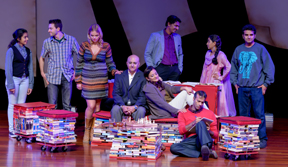 Chaotic behavior exists in many natural systems, such as weather, climate, and in human conditions. That seems to be the point that playwright, Anuvab Pal tries to get across in EnActe Arts’ ninth theater production, “Chaos Theory” that played over the weekend in Palo Alto’s Cubberly Theater.
Chaotic behavior exists in many natural systems, such as weather, climate, and in human conditions. That seems to be the point that playwright, Anuvab Pal tries to get across in EnActe Arts’ ninth theater production, “Chaos Theory” that played over the weekend in Palo Alto’s Cubberly Theater.
Aligning a mathematical theory that studies the behavior of dynamical systems that are highly sensitive to initial conditions to the unfulfilled love story of the play does seem a bit of a stretch. Pal leans on the correlation that is suggested by the unpredictability of future outcomes due to small differences in initial conditions of dynamical systems.
Young love is unpredictable, and young lovers are dynamic; not bound by traditional expectations, rendering long term prediction impossible. When you get past the implications of all this wordsmithing, “Chaos Theory” simply is a story of two headstrong individuals, who, as young college students squabble over the nuances of the English language, argue over the choice of music, and hotly debate selection of cuisine.
Young Mukesh is decidedly “foreign” in his inclinations, disdaining “native culinary disasters” such as samosas, and preferring to quote multiple English authors at the drop of a hat. Young Sunita is more conservative in dress, likes all things Indian, and displays a strong command of the English language as she beats Mukesh at his own quotation game of guessing the author of the quotes. Love is not professed and the two depart when Sunita sets sail for the U.S where she expects to find freedom.
The opening scene of the play, set in adult Sunita’s living room picks up on the quotation game the two played in college, with Sunita once again having an upper hand. As the story unfolds, it traces their very different trajectory after leaving college.
While pursuing a degree in Indian history, Sunita gets married to Amit, played by Anurag Mairal, a playwright with interesting ideologies, who seems to have acquired the American dream, complete with two children. At some point, her divorce from Amit is revealed, as she continues her friendship with Mukesh, who ended up as a Professor of English in a university in close proximity.
Meanwhile Mukesh acquires a girlfriend, who is also his student, and, who he ends up marrying and subsequently divorcing. Each of them derides the other’s choice of mate in some tragically comic moments on stage.
The relationship between these two middle aged eccentric professors, shows them reverting to their old camaraderie and casual intimacy, while maintaining a stoic attitude about their mutual love.
Through the clever use of snippets of flashbacks and tete a tetes, it becomes obvious that Sunita and Mukesh have merged to the same juncture whence they departed.
Pregnant pauses, unsaid feelings, muted expressions convey the unspoken spark between them, however, the chaos reigns supreme, in that their ultimate destiny remains sensitive to initial conditions.
When Sunita decides to return to India to teach young minds, it seems like a desperate cry to seek fulfillment which she was denied during her tenure in the US, and she is still searching for something to live for.
“We’ve been too close for too long” a dialogue uttered by Sunita sums up that moment when undeclared feelings will decide their future. She wistfully quotes Rabindranath Tagore in her lectures where he talks about loving someone who loves you back.
Some very pleasurable aspects of the play were the deft rearrangements of the scenes, the flashbacks with quirky use of projected photographs, the skillful use of the few pieces of furniture to simulate movement and period. Vishal Vimal and Geeta Rai as the Props team deserve special mention, as does Meghna Singhal for handling the lights.
Witty dialogue and intelligent quips further stir up the imagination and add mirth to otherwise serious scenes. Overall, the play got the message across of strong feelings between strong individuals do not always result with them spending their lives together, however frequently they meet and remain in touch.
Not knowing what could have been is their chaos. Much is also left unsaid about why Sunita and Mukesh choose the mates they do, or break up with them….
Most scenes are played out with two characters on stage, and Vinita Sud Bilani as Sunita, and Puneet as Mukesh carry this burden with aplomb and skill.
Due to the quick succession of scenes, dialogue does not drag, and the play maintains a fast, albeit sometimes a hectic pace of moving between the past and present. We all continue to sort out our chaotic lives without paying too much heed to the chaos in the universe around us.
Archana Asthana






